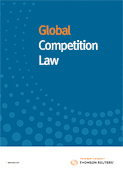 독점규제법 –글로벌 편– Global Competition Law
독점규제법 –글로벌 편– Global Competition Law- 카테고리: [기업일반]
-
강 사 Thomson Reuters Risk Course (online) 신 청 기 간 2021년 01월 01일~2021년 12월 31일 교 육 시 간 총 1강 약 0시간 수 강 기 간 결제일로부터 180일 이내 수료증발급 수업의 [80%]이상 수강시 수료증 발급 대 상 전 직원 교 육 비 ₩128,000
- 본 강좌는 2021.12.31 [수강신청 마감]되었습니다.
| Many countries around the world, including the United States, Canada and the European Union, have enacted competition laws that make it illegal for firms to reduce competition by unfair means — for example, price fixing, bid rigging, group boycotts and agreements to allocate markets or customers. The purpose of these laws is to protect consumers from unfair business practices by ensuring the marketplace remains competitive. The presence of free and fair competition provides consumers with the highest quality goods and services at the lowest prices. If firms were allowed to use anticompetitive tactics, healthy competition would cease to exist and the markets would become distorted. A failure to comply with competition laws can result in severe financial penalties and damage to the firm’s reputation, as well as criminal and civil sanctions against the individuals involved. Firms can avoid these costly enforcement efforts by making sure all employees understand how competition laws affect their day-to-day work and how to recognize and deal with situations that present a risk of competition violations. This Competition Law course covers the fundamental principles of competition law (or antitrust or monopoly law, as it is sometimes called), which aims to prevent predatory business practices by promoting fair competition and economic efficiency. The course also highlights 'red flags' — situations that present a risk of violations and legal liability, enforcement, and civil and criminal penalties associated with violations of competition law. |
 교육특징
교육특징
- 본 교육과정은 주로 e-book 형태로 콘텐츠가 구성되어 있으며, 일부 시나리오 영상 콘텐츠가 포함되어 있습니다. (첨부된 영상 콘텐츠는 영어로 진행되나 한글 스크립트를 포함하고 있습니다.)
- 본 교육과정은 톰슨로이터의 글로벌 LMS(learning Management System)을 이용하여 서비스되는 온라인 컨텐츠로 로앤비 교육센터에서 신청 및 결제 후, 별도의 안내에 따라 다른 웹사이트에서 교육수강을 진행하게 됩니다.
(해당 LMS에 신청자 정보를 등록하고 사용자의 ID/PW를 부여하는 부분에 최대 72 시간이 소요될 수 있습니다. 일반적으로는 결제완료 후, 1일 이내로 로앤비 교육센터의 담당자가 수강과 관련된 안내메일을 고객님께 발송합니다.) - 본 교육과정은 6개월간 반복하여 수강할 수 있습니다.
- 본 교육과정은 낱개과정과 묶음과정으로 구성되어 있으며, 묶음과정은 25%의 할인이 제공됩니다.
 교육일정
교육일정
학습목표
커리큘럼
- 독점규제법의 중요성을 설명할 수 있습니다.
- 독점규제법이 금지하는 행위에 대해 학습합니다.
- 독점규제법 관련 관리 기관의 권한을 살펴봅니다.
- 독점규제법 위반 시의 엄중한 처벌에 대해 학습합니다.
- 독점규제법 하에서 개인에게 적용되는 의무를 설명할 수 있습니다.
커리큘럼
| No | 강의주제 | 시간 | 언어 |
|---|---|---|---|
| 1 | 소개 및 배경 Introduction and Background |
45분 |
한국어 |
| 2 | 거래 제한 Restraint of Trade |
||
| 3 | 시장지배적 지위 남용 행위 Abuse of Dominance |
||
| 4 | 다른 규제의 고려사항 Other Regulatory Considerations |
 강사소개
강사소개

|
|
 참가신청
참가신청
- 본 강좌는 2021.12.31 [수강신청 마감]되었습니다.
- 전화) 02)6467-5501 팩스) 02)3472-1413 이메일) webmaster.lawnbedu@thomsonreuters.com

서비스 준비중 입니다.
현재 모바일 환경에서는 샘플영상이 제공되지 않습니다.
PC환경에서 이용하여 주시기를 바랍니다.
닫기
PC환경에서 이용하여 주시기를 바랍니다.








































